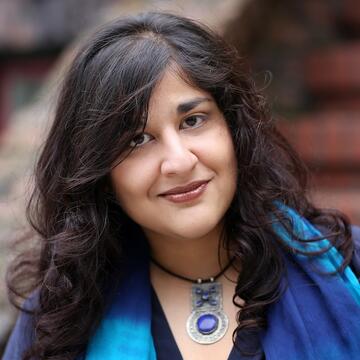
Taymiya R. Zaman
Professor
Full-Time Faculty
Kalmanovitz Hall 318
Biography
Taymiya R. Zaman joined the University of San Francisco in 2007. Her area of research expertise is Mughal India and her current research interests include historical memory in South Asia, the interconnectedness of life writing and history, and the transition from subjects to citizens in the Islamicate world. She has designed the History Department's "Islamic World" emphasis and teaches courses on the Ottoman, Safavid, and Mughal Empires and the making of modern South Asia and the Middle East. She also writes narrative non-fiction and fiction.
Research Areas
- Mughal India
- Historical memory
- Auto/biography
- Ottoman, Safavid, and Mughal Empire
- Colonialism and the global south
Appointments
- Chair, Department of History
- Director of Asian Studies, University of San Francisco
- Director of Middle Eastern Studies, University of San Francisco
Education
- University of Michigan, Ann Arbor, PhD in History, 2007
- Smith College, Northampton, MA, B.A. in Philosophy, 2001
Prior Experience
- Visiting Professor, Institute of Business Administration, Karachi, Pakistan
- Visiting Professor, Lahore University of Management Sciences, Lahore, Pakistan
- Assistant Professor, University of San Francisco
Awards & Distinctions
- Distinguished Teaching Award, 2022
- Arthur I. Karshmer Award for Distinguished Service to Disability Issues, 2023
Selected Publications
- "Chasing India in Mexico City." History and Theory 60, 3 (2021): 534-540.
- "An Islam of One's Own: A Review of Shahab Ahmed." Comparative Studies of South Asia, Africa, and the Middle East, May 2020, 40 (1): 214-219
- "Riffat’s Diary." Cagibi (July, 2019)
- Review of Samia Khatun, Australianama: The South Asian Odyssey in Australia (London: Hurst, 2018). Roundtable for Chapati Mystery, 2019.
- “Fathnama-i-Chittor,” edited and annotated translation. Empires of the Near East and India: Sources for the Study of the Safavid, Ottoman, and Mughal Societies ed. Hani Khafipour. Columbia University Press, 2019.
- “Betrayal, Conversion, and Complicity in the Middle East Classroom.” Troubled History, Troubling Times: Teaching and Learning about the Difficult Past eds. Magdalena Gross and Luke Terra. Routledge, 2019.
- “The Mughal Emperor Aurangzeb Holding Audience." Asian Art Museum of San Francisco: Collection Highlights. San Francisco: Asian Art Museum of San Francisco, 2018."
- "Cities, Time, and the Backward Glance." The American Historical Review 123, 3: 699-705. 2018.
- "On the Limits and Possibilities of History." History Compass, 15, 12. 2017.
- "A Hindu Soldier’s Aurangzeb." In The Wire, India. 2016.
- "Nostalgia, Lahore, and the Ghost of Aurangzeb." Fragments: Interdisciplinary Approaches to the Study of Ancient and Medieval Pasts. 2015.
- "I Speak for Myself: American Muslim Women's Confessional Writings and the Problem of Alterity," with Aysha Hidayatullah. Journal for Islamic Studies. 2013.
- "Not Talking about Pakistan." In Critical Muslim 04: Pakistan?, edited by Zia Sardar and Robin Yassin-Kassab. Re-published in Tanqeed: A Magazine of Politics and Culture. 2012.
- "Thirst: A Story." In Narrative Magazine. 2012.
- "Visions of Juliana: A Portuguese Woman at the Court of the Mughals." Journal of World History. 2012.
- "Muslims, Jews, and Religious Visibility on American College Campuses." In Friends and Foes: The Complexity of Current Jewish-Muslim Relations in the United States, edited by Reza Aslan and Aaron Hahn Tapper. Palgrave Macmillan. 2011.
- "Instructive Memory: Auto/biography in Early Mughal India." Journal of the Economic and Social History of the Orient. 2011.
- Review of William Dalrymple, The Last Mughal. Journal of British Studies. 2008.
- Review of Sikata Banerjee, Make Me a Man: Masculinity, Hinduism, and Nationalism in India. Studies in Ethnicity and Nationalism. 2008.